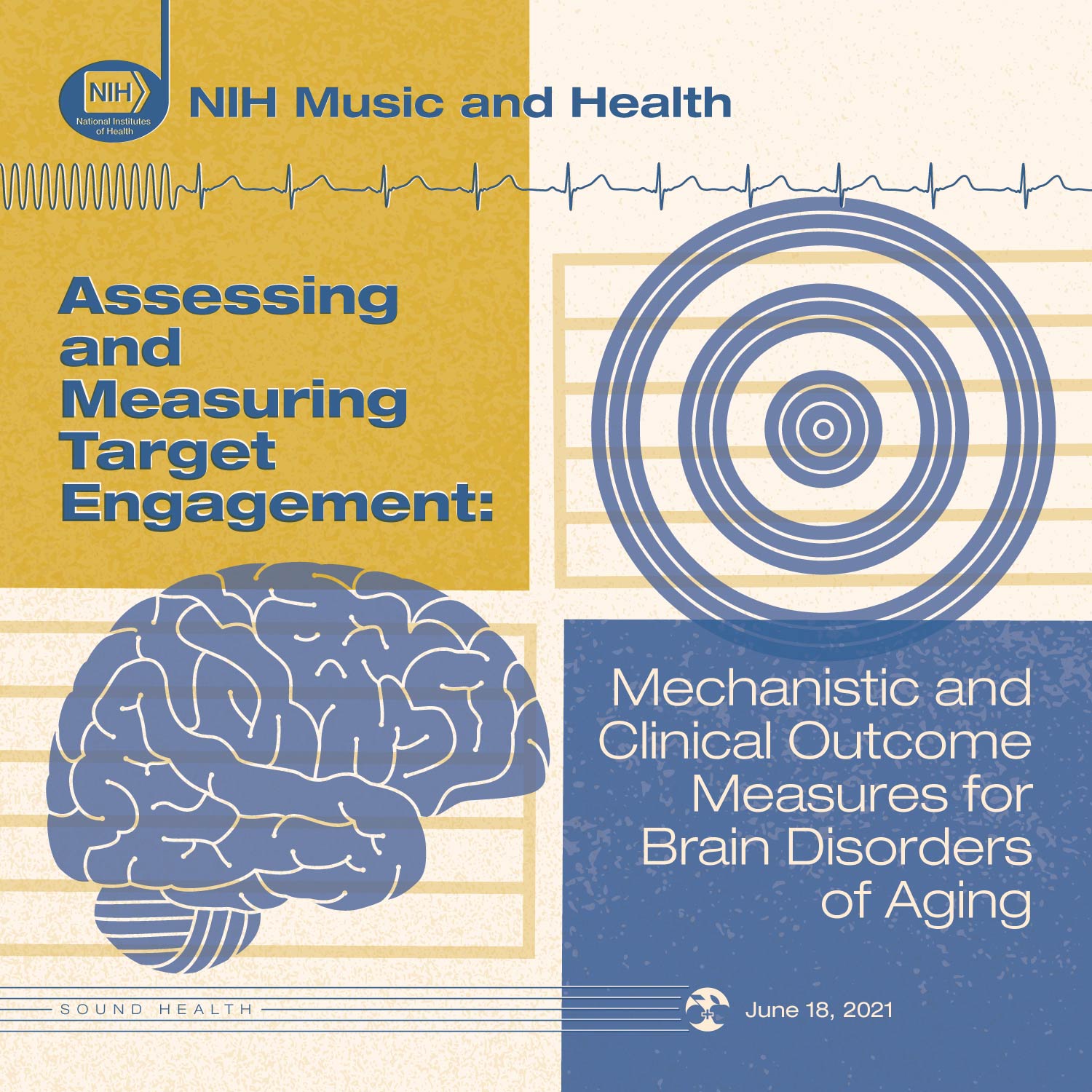Music and Health: Assessing and Measuring Target Engagement—Mechanistic and Clinical Outcome Measures for Brain Disorders of Aging
Date: June 18, 2021 - 1:00 p.m. ET to 4:00 p.m. ET
Virtual
Event Description
This is the second of three meetings that are part of Phase I of a National Institutes of Health (NIH)/Foundation for the National Institutes of Health (FNIH) project to develop evidence-based music therapies for brain disorders of aging.
This meeting will gather input from participants in the music therapy/music medicine, neuroscience, behavioral intervention development, clinical trial methodology, and patient advocacy/art organization communities. The NIH planning committee will assess, evaluate, and identify the most feasible and relevant functional outcome measures in domains relevant to brain disorders of aging: cognition, emotion, and motor and sensory functions. This core dataset of outcome measures will be used in future NIH-funded music-based intervention protocols.
- Download the program book [3.48 MB PDF], which includes abstracts, bios, and panelists' questions
NIH Music and Health Meeting Series:
- March 31, 2021: Laying the Foundation: Defining the Building Blocks of Music-Based Interventions
- June 18, 2021: Music and Health: Assessing and Measuring Target Engagement—Mechanistic and Clinical Outcome Measures for Brain Disorders of Aging
- August 25, 2021: Relating Target Engagement to Clinical Benefit: Biomarkers for Brain Disorders of Aging

Watch the event:
Agenda
1:00–1:10 p.m. | Welcome
- Francis S. Collins, M.D., Ph.D., Director, National Institutes of Health (NIH)
- Renée Fleming, Renowned Soprano, Arts and Health Advocate
1:10–1:15 p.m. | Setting the Stage: Music-Based Interventions (MBIs) for Brain Disorders of Aging
- Coryse St. Hillaire-Clarke, Ph.D., Program Director, Sensory and Motor Disorders of Aging Program, Division of Neuroscience, National Institute on Aging
1:15–1:40 p.m. | Measurement Advances: Implications for the Sound Health Initiative
- William T. Riley, Ph.D., Director, Office of Behavioral and Social Sciences Research
Presentation (20 minutes)
Question and Answer Session (5 minutes)
1:40–1:50 p.m. | Charge to Panelists and Thematic Group Discussion Setup
- Emmeline Edwards, Ph.D., Director, Division of Extramural Research, National Center for Complementary and Integrative Health
- Alan Weil, J.D., M.P.P., Editor-in-Chief, Health Affairs
1:50–2:10 p.m. | Question 1: What are the important considerations for selecting mechanistic and clinical outcome measures for brain disorders of aging? When designing MBIs for brain disorders of aging, what are the most important functional domains to be considered (cognition, emotion, motor, sensory, interoception)?
2:10–2:30 p.m. | Question 2: What are the most useful mechanistic outcomes for Alzheimer’s disease and Alzheimer’s disease related dementias (AD/ADRD), Parkinson’s disease (PD), and stroke that can be used to assess target engagement?
- Functional imaging and functional connectivity outcomes
- Electrophysiological outcomes
- Social and behavioral outcomes
- Cognitive and physiological outcomes
- Linguistic responses/processes
- Music-centered responses/processes
2:30–2:40 p.m. | Break
2:40–3:10 p.m. | Question 3: What are the advantages and disadvantages to be considered when prioritizing clinical outcome measures for AD/ADRD, PD, and stroke (e.g., objective, performance-based, patient-reported, functional)?
- Prioritization based on the intervention
- Primary vs. secondary outcome measures
- Proximal vs. distal (i.e., short- and long-term) outcome measures
- Engaging participants and caregivers
- Remotely collected measures (i.e., ecological momentary assessment [EMA])
- Linguistic outcomes
- Music-centered outcomes
3:10–3:25 p.m. | Question 4: How valid and reliable are existing tools and resources (e.g., the Patient-Reported Outcomes Measurement Information System [PROMIS®], the NIH Toolbox®, Quality of Life in Neurological Disorders [Neuro-QoL™], Science of Behavior Change [SOBC]) for studying MBIs for brain disorders of aging?
What new tools or resources are needed?
3:25–3:55 p.m. | Broad Question and Answer Session
- Videocast audience and Zoom meeting participants
3:55–4:00 p.m. | Wrap-Up and Next Steps
- Robert Finkelstein, Ph.D., Director, Division of Extramural Activities, National Institute of Neurological Disorders and Stroke
Individuals who need reasonable accommodation to participate should contact info@nccih.nih.gov or the Federal Relay, 1-800-877-8339, by Friday, June 11.